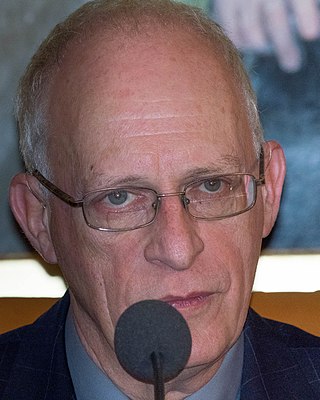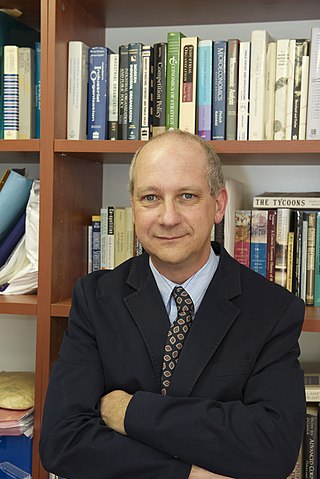Related Research Articles
In economics, industrial organization is a field that builds on the theory of the firm by examining the structure of firms and markets. Industrial organization adds real-world complications to the perfectly competitive model, complications such as transaction costs, limited information, and barriers to entry of new firms that may be associated with imperfect competition. It analyzes determinants of firm and market organization and behavior on a continuum between competition and monopoly, including from government actions.
A chief executive officer (CEO) is the highest officer charged with the management of an organization – especially a company or nonprofit institution.
A state-owned enterprise (SOE) is a government entity which is established or nationalised by a national or provincial government, by an executive order or an act of legislation, in order to earn profit for the government, control monopoly of the private sector entities, provide products and services to citizens at a lower price, implement government policies, and/or to deliver products & services to the remote locations of the country. The national government or provincial government has majority ownership over these state owned enterprises. These state owned enterprises are also known as public sector undertakings in some countries. Defining characteristics of SOEs are their distinct legal form and possession of financial goals and developmental objectives. SOEs are government entities established to pursue financial objectives and developmental goals.
Corporate governance are mechanisms, processes and relations by which corporations are controlled and operated ("governed").

State ownership, also called public ownership or government ownership, is the ownership of an industry, asset, or enterprise by the state or a public body representing a community, as opposed to an individual or private party. Public ownership specifically refers to industries selling goods and services to consumers and differs from public goods and government services financed out of a government's general budget. Public ownership can take place at the national, regional, local, or municipal levels of government; or can refer to non-governmental public ownership vested in autonomous public enterprises. Public ownership is one of the three major forms of property ownership, differentiated from private, collective/cooperative, and common ownership.
Tunneling or tunnelling is financial fraud committed by "the transfer of assets and profits out of firms for the benefit of those who control them". In legal terms, this is known as a fraudulent transfer, such as when a group of major shareholders or the management of a publicly-traded company orders that company to sell off its assets to a second company at unreasonably low prices. The shareholders or management typically own the second company outright, and thus profit from the otherwise disastrous sale. Tunneling differs from outright theft because people who engage in tunneling generally comply with all of the relevant legal procedures; it is thus a subtler scheme than simply writing checks from a company to a private bank account. While people widely agree that tunneling is unethical, penalties for it vary widely; some states impose criminal sanctions, whereas other states provide either for civil suits only, or for no sanctions at all.
The legal origins theory claims that the two main legal traditions or origins, civil law and common law, crucially shape lawmaking and dispute adjudication and have not been reformed after the initial exogenous transplantation by Europeans. Therefore, they affect economic outcomes to date. According to the evidence reported by the initial proponents of such a theory, countries that received civil law would display today less secure investor rights, stricter regulation, and more inefficient governments and courts than those that inherited common law. These differences would reflect both a stronger historical emphasis of common law on private ordering and the higher adaptability of judge-made law.

Andrei Shleifer is a Russian-American economist and Professor of Economics at Harvard University, where he has taught since 1991. Shleifer was awarded the biennial John Bates Clark Medal in 1999 for his seminal works in three fields: corporate finance, the economics of financial markets, and the economics of transition.
An agency cost is an economic concept that refers to the costs associated with the relationship between a "principal", and an "agent". The agent is given powers to make decisions on behalf of the principal. However, the two parties may have different incentives and the agent generally has more information. The principal cannot directly ensure that its agent is always acting in its best interests. This potential divergence in interests is what gives rise to agency costs.
A market anomaly in a financial market is predictability that seems to be inconsistent with theories of asset prices. Standard theories include the capital asset pricing model and the Fama-French Three Factor Model, but a lack of agreement among academics about the proper theory leads many to refer to anomalies without a reference to a benchmark theory. Indeed, many academics simply refer to anomalies as "return predictors", avoiding the problem of defining a benchmark theory.
Limits to arbitrage is a theory in financial economics that, due to restrictions that are placed on funds that would ordinarily be used by rational traders to arbitrage away pricing inefficiencies, prices may remain in a non-equilibrium state for protracted periods of time.

Sir Oliver Simon D'Arcy Hart is a British-born American economist, currently the Lewis P. and Linda L. Geyser University Professor at Harvard University. Together with Bengt R. Holmström, he received the Nobel Memorial Prize in Economic Sciences in 2016.
Michael Cole Jensen was an American economist who worked in the area of financial economics. Between 2000 and 2009 he worked for the Monitor Company Group, a strategy-consulting firm which became "Monitor Deloitte" in 2013. Until 2000, he held the position of Jesse Isidor Straus Professor of Business Administration at Harvard University.
In finance, momentum is the empirically observed tendency for rising asset prices or securities return to rise further, and falling prices to keep falling. For instance, it was shown that stocks with strong past performance continue to outperform stocks with poor past performance in the next period with an average excess return of about 1% per month. Momentum signals have been used by financial analysts in their buy and sell recommendations.
State media are typically understood as media outlets that are owned, operated, or significantly influenced by the government. They are distinguished from public service media, which are designed to serve the public interest, operate independently of government control, and are financed through a combination of public funding, licensing fees, and sometimes advertising. The crucial difference lies in the level of independence from government influence and the commitment to serving a broad public interest rather than the interests of a specific political party or government agenda.
Rafael La Porta is the Robert J. and Nancy D. Carney University Professor of Economics at Brown University. La Porta received his A.B. in economics at Pontifical Catholic University of Argentina in Argentina and his A.M. and Ph.D. in economics at Harvard University in Cambridge, MA. La Porta served as a professor of economics at Harvard and the Tuck School of Business at Dartmouth College before accepting a position at Brown. His research is primarily in corporate governance and investor protections across the world. He is the coauthor of the influential article "Law and Finance," which appeared in the Journal of Political Economy in December 1998.
Leximetrics is a field which attempts to rank the strength or weaknesses of laws, by assigning a numerical value to each type of law in a particular field. The law's numbers are then used to compare the efficacy of different legal systems, and how these numbers correlate with particular goals such as economic growth or employment.

Yishay Yafeh is an Economist and a Professor of Finance at the Hebrew University of Jerusalem School of Business Administration in Israel. Between 2010–2012 he was the vice- dean of the Hebrew University School of Business Administration and the Dean of the School between 2012–2016.
LSV Asset Management (LSV) is an American quantitative investment management firm headquartered in Chicago. The firm provides equity management services for institutional investors.
Anup Agrawal is a professor of Finance and Powell Chair of Finance at the University of Alabama. He is known for his research in Corporate Finance and Investments, including Corporate Governance, Mergers and Acquisitions, Executive Compensation, Corporate Innovation, Corporate Fraud, Insider Trading, Security Analysts, and Market Efficiency.
References
- 1 2 Vishny, Robert W. (1985). Informational aspects of securities markets (Ph.D.). MIT . Retrieved April 5, 2018.
- ↑ Vishny, Robert (2024-04-24). "Google Scholar". Google Scholar. Retrieved 2024-04-24.
{{cite web}}: CS1 maint: url-status (link) - ↑ Bonaime, Alice. "Alice Bonaime". Alice Bonaime. Retrieved 2024-04-24.